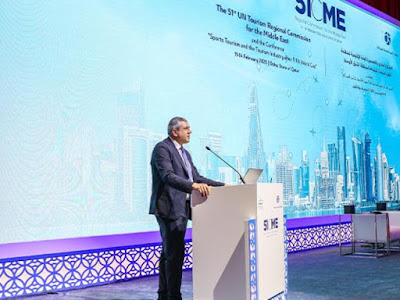On February 12, 2025, Qatar Tourism hosted the 51st meeting of the UN Tourism Regional Commission for the Middle East, gathering high-level delegations from thirteen member states to evaluate the tourism sector’s performance. Discussions centered around the achievements of the region and the identification of key priorities aimed at further boosting tourism. This meeting underscored the importance of regional collaboration and cooperation in improving the tourism sector in the Middle East.
Middle East’s Post-Pandemic Recovery
The UN Tourism organization highlighted the Middle East’s remarkable recovery from the impacts of the pandemic in 2024, which had been the fastest recovery globally. This impressive recovery positioned the region as a key player in the global tourism industry. The event revealed that while many regions struggled to regain pre-pandemic tourism numbers, the Middle East managed to quickly bounce back due to concerted efforts and strong regional cooperation.
The meeting was pivotal in reaffirming the Middle East’s role as a significant tourism hub on the global stage, and it identified strategies for maintaining the momentum of growth in the coming years. A key component of the discussions was the importance of ensuring sustainability in tourism development and the need for continued collaboration among countries in the region.
Kuwait’s Leadership in Regional Tourism Development
During this meeting, the State of Kuwait was appointed as the Chair of the Regional Committee for the 2025-2027 term. This new leadership position for Kuwait is a significant milestone in the region’s tourism development. As Chair, Kuwait will play an integral role in setting the agenda for the region’s tourism sector, shaping policies, and guiding regional initiatives. Alongside Kuwait, Qatar was appointed as First Vice-Chair, with Iraq taking on the role of Second Vice-Chair. This leadership structure is expected to encourage even greater collaboration and focus on regional priorities for tourism growth and sustainability.
Kuwait’s appointment as Chair reflects the country’s growing influence and commitment to developing its tourism sector. The country’s plans to host the 52nd Regional Meeting in 2026 further exemplify its proactive approach in fostering international dialogue and cooperation within the tourism sector. This event will serve as a critical platform for continuing efforts to promote sustainable tourism and advance regional partnerships.
Qatar’s Growing Influence in Global Tourism
Qatar’s role in the region’s tourism development was reinforced during this meeting. The country’s appointment as First Vice-Chair underscores its growing leadership in the global tourism landscape. Qatar’s tourism sector has seen significant growth, with investments in infrastructure, tourism services, and the development of major events playing a key role in the country’s emerging global prominence. The country’s involvement in the Regional Committee for the 2025-2027 period signals its continued dedication to shaping the future of tourism in the Middle East and beyond.
Qatar’s commitment to transforming itself into a global tourism hub is closely aligned with its long-term vision for economic diversification and growth. With major events such as the FIFA World Cup Qatar 2022™ already contributing to the region’s tourism success, Qatar continues to leverage its sporting achievements to drive growth in other tourism sectors.
The “Sports Tourism and the Tourism Industry After the World Cup” Conference
Following the UN Tourism meeting, Qatar Tourism hosted the “Sports Tourism and the Tourism Industry After the World Cup” conference on February 13, 2025. The conference gathered experts and specialists from the tourism and sports industries to discuss the lasting impact of major sporting events on tourism. A focal point of the discussions was how to harness the momentum generated by the FIFA World Cup Qatar 2022™ and leverage it for long-term sports tourism development.
Qatar’s strategic investments in sports clubs and athletes have significantly bolstered its position as a global sports tourism hub. The country’s continued focus on sports infrastructure, coupled with innovative approaches to tourism, positions the Middle East, and Qatar in particular, as an emerging leader in sports tourism. The role of technology in enhancing the sports tourism experience was also a major theme, with experts exploring how advancements could create more immersive and accessible experiences for global travelers.
Additionally, the conference underscored the collaboration between Qatar and its neighboring countries, recognizing that a unified regional approach to sports tourism could elevate the Middle East as a premier global destination. This collaboration is expected to enhance the overall tourism appeal of the region, attracting travelers not only for sporting events but also for the rich cultural, historical, and leisure offerings in the region.
Impact on the Global Travel Industry
These developments are set to have a significant impact on the global travel industry. As the Middle East solidifies its position as a premier destination for both traditional and sports tourism, travelers worldwide will likely experience increased access to new experiences and destinations. Countries in the region, such as Kuwait, Qatar, and Iraq, are taking a leading role in shaping tourism trends, focusing on sustainability, innovation, and regional cooperation.
The emphasis on sports tourism, in particular, highlights the growing importance of major sporting events in driving international travel. The global attention brought by events like the World Cup will continue to stimulate interest in regional travel, creating more opportunities for both international and domestic tourism in the years to come.
The regional meeting and subsequent conference reinforced the Middle East’s central role in global tourism development. With Qatar’s active leadership and Kuwait’s new role as Chair, the region is poised to further enhance its influence in the tourism sector. Travelers will benefit from this growing focus on sustainability, sports tourism, and innovative tourism experiences, which will likely make the Middle East an even more attractive destination in the coming years.
Tags: Qatar Tourism, Middle East, UN Tourism, FIFA World Cup Qatar 2022™
